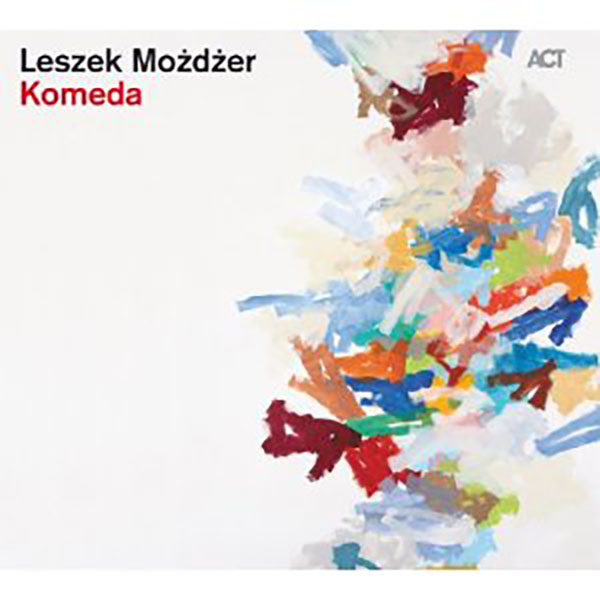
by Ian Mann
August 15, 2011
/ ALBUM
A fitting homage but also an excellent work in its own right.
Leszek Mozdzer
“Komeda”
(ACT Music ACT 9516-2)
Polish pianist Leszek Mozdzer first came to my attention on the 2007 ACT release “Pasodoble”, an intimate duo recording made with Swedish bassist and cellist Lars Danielsson. “Pasodoble” received a great amount of critical acclaim both on this site and elsewhere and the duo also made a highly successful performance at the 2009 London Jazz Festival, an event covered by my co-writer Tim Owen as part of his “On the Piano Trail, London Jazz Festival 2009” feature.
Mozdzer also featured as part of the band deployed by Danielsson on another highly acclaimed ACT release, 2009’s “Tarantella”. His latest offering is a solo piano release exploring the music of one of the pioneers of Polish jazz, the late pianist and composer Krzystof Komeda (1931-69). The album is the latest in a series of excellent ACT solo piano recordings by Vijay Iyer, Iiro Rantala Gwilym Simcock and others. The Simcock release, “Good Days At Schloss Elmau” has just been nominated for the 2011 Mercury Music Prize.
Born in 1971 Mozdzer is something of a star in his native Poland and has worked with other leading Polish jazz musicians including trumpeter Tomasz Stanko and violinist Michal Urbaniak. Although he is classically trained it is totally appropriate that he should wish to explore the music of Komeda. The late jazz pianist and film composer has acquired near legendary status in Poland where he is regarded as a national musical hero, almost on a par with Frederic Chopin, Mozdzer’s initial inspiration.
Mozdzer tackles eight of Komeda’s most enduring compositions. He brings a sense of classical discipline and lightness of touch to the music and much of the playing is serene, lyrical and often very beautiful. But for all this Mozdzer is not afraid to muddy the waters, there are also moments of wilful dissonance, particularly appropriate in the closing stages of “Sleep Safe and Warm”, Komeda’s theme for “Rosemary’s baby”, the controversial Polish film director Roman Polanski’s unsettling account of demonic possession.
Mozdzer begins with Komeda’s “Svantetic” from the classic 1965 Komeda Quintet album “Astigmatic”. Komeda had close cultural links with Sweden and the tune was originally inspired by the Swedish writer Svante Foerster. Swedish drummer Rune Carlsson played on “Astigmatic” and Komeda later also worked with Swedish saxophonist Bernt Rosengren. For the melody of “Svantetic” Komeda drew on folk music forms and Mozdzer’s interpretation reflects this, contrasting the simplicity of the melody with elements of jazz improvisation and classical virtuosity and ending with a dash of the dissonance alluded to previously.
“Sleep Safe and Warm” mixes melody with sombre, brooding textures, with rumbling left hand figures periodically ruffling the superficially calm surface. By contrast “Ballad for Bernt”, Komeda’s dedication to Rosengren, reveals Mozdzer at his most lyrical and with the emphasis firmly on the beauty of the melody.
“The Law and The Fist” displays a serenity that belies the rather forbidding wording of the title. Mozdzer distils the beauty of the melody to its essence during a lengthy near eleven minute investigation.
At thirteen and a half minutes “Nighttime, Daytime Requiem” represents an even deeper submersion into Komeda’s music with the pianist displaying an astonishing level of skill. From glacial trills to a lightly skipping right hand virtuosity Mozdzer has it all, sometimes punctuating things with a more sinister left hand rumble as if to maintain a level of dramatic tension.
“Cherry” moves away from the overtly Romantic mood to add an element of playfulness and an almost Monkish cerebral funkiness to the proceedings.
Mozdzer tackles “Crazy Girl” at a slower pace than the original and subtly alters the rhythms and harmonies. The results are stunning in their beauty and the piece has become something of a favourite with other commentators and rightly so.
The closing “Moja Ballada” is similarly lush and beautiful but ends with a brutal suddenness, as if in acknowledgement of Komeda’s tragic (and mysterious) death at the age of just thirty eight.
Mozdzer’s “Komeda” is both a fitting homage but also an excellent work in its own right. The overall mood is Romantic and highly melodic and this is a readily accessible album that is likely to hold considerable appeal to both jazz and classical listeners. However for all its easiness on the ear there are still plenty of interesting things going on beneath the superficially calm surface and Mozdzer brings a high level of musical sophistication and a huge degree of technical skill to the proceedings. “Komeda” may lack the range of the recent solo releases by Vijay Iyer or Gwilym Simcock but the largely unified mood should appeal to fans of both Frederic Chopin and Keith Jarrett alike.
COMMENTS
MIKE KILLINGWORTH says;
If anyone can console us for the tragic death of Esbjorn Svensson it is probably Mozdzer. If you haven’t heard his “Between Us and the Light” (Outside Music, 2006) with Danielson and percussionist Zohar Fresco you have a 5-star treat in store…
ACT, like ECM, rarely release a dud IMHO.
blog comments powered by Disqus